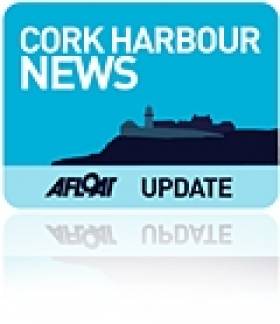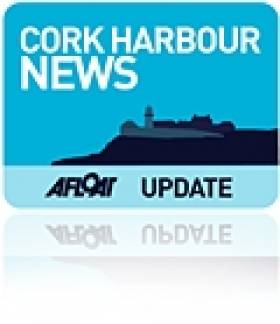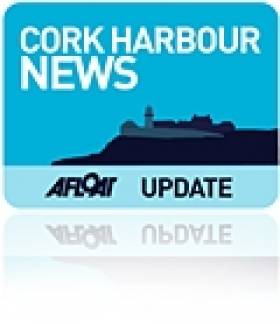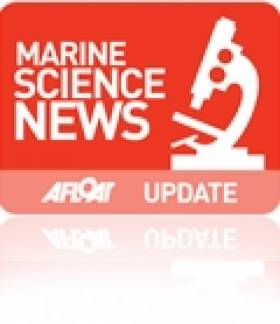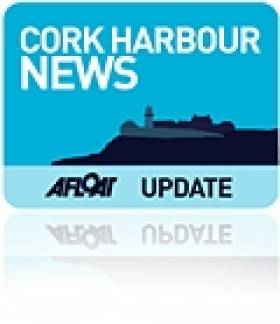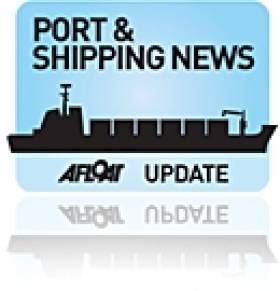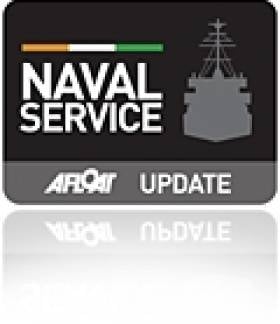Displaying items by tag: National Maritime College of Ireland
Irish Maritime Forum 2015 Heads for Cork
#IrishMaritimeForum - The Irish Maritime Forum 2015 will look at "Success through synergy – an innovative & dynamic approach to the future" by exploring the ocean of opportunities that exist within the sector and concentrating on the key drivers that are set to change the sector in the future.
The Irish Maritime Forum will take place at the National Maritime College of Ireland (NMCI), Ringaskiddy on September 25th 2015 between 08:30 to 17:00 hours.
The event is sponsored by Copius Resources, which is aimed at organisations and professionals within the maritime industry in Ireland.
This event, which will be formally opened by Minister Simon Coveney, is aimed at organisations and professionals operating within the broad maritime industry in Ireland.
On the proceeding day of the Maritime Forum, there is a drinks reception (sponsors & speakers only) on the evening of Thursday 24th which will be held at the Port of Cork. This social event will be followed by the main event as referred above on Friday 25th at the NMCI.
The programme for the main event will focus on a number of core themes, namely;
• The Maritime Industry (Sponsored by NMCI Services)
• Maritime Skills & Human Resources (Sponsored by Copius Resources)
• Port Sector (Sponsored by Ardmore Shipping Ltd.)
• Offshore & Renewables Sector (Sponsored by Irish Mainport Holdings Ltd.)
• Marine Tourism & Leisure (Sponsored by Port of Cork)
For further information regarding booking of this ticketed event, visit the official conference website: http://www.irishmaritimeforum.ie/
National Maritime College Of Ireland Wins Prestigious Award
#NMCI - The National Maritime College of Ireland (NMCI) in Cork Harbour has been recognised for its excellence at the 2015 Irish Logistics and Transport Awards for the second year in succession.
Taking the award for its Bachelor of Business degree in Supply Chain and Transport Management, the NMCI was also nominated for the overall Excellence in Logistics Award.
Jane O'Keeffe, director of supply chain at the NMCI, collected the award at an annual gala event in Dublin attended by over 400 delegates from the logistics and transport sector.
The NMCI, a constituent college of Cork Institute of Technology which last year celebrated its first decade in operation, focuses on both maritime and non-maritime industry sectors – with partnerships such as the Canary Islands' first Offshore Survival Training Centre – and offers customised education and training programmes to meet individual requirements.
The Bachelor of Business in Supply Chain and Transport Management degree programme is designed to support industry requirements for those with experience in logistics and supply chain management and those who wish to further their career prospects.
This unique programme, now in its eight year, builds upon the student's experiential knowledge and provides grounding in a wide and diverse range of disciplines.
To date, graduates have experienced excellent employment and career progression opportunities in both indigenous and multi-national organisations.
The NMCI says the programme has been so successful within the logistics and supply chain industry nationally that it is proposed to incorporate modules in logistics and supply chain into the Bachelor Degrees in Nautical Science, Marine Engineering and Marine Electro-technology.
The Government Future Skills Needs publication in February of this year highlighted the freight transport, distribution and logistics (FTDL) sector in Ireland as a significant growth area for the period 2015-2020. Programmes such as those on offer at the NMCI are seen to address the opportunities highlighted at middle management level within the sector.
The NMCI says it is ideally positioned to support logistics and supply chain education and job creation as in excess of 90% of global trade by volume is transported by sea.
This is an indication of the importance of logistics to the maritime industry, and of even greater importance to Ireland, where 98% of trade by volume comes through its seaports.
The NMCI facility in Cork Harbour, which the college says embraces advanced technologies including simulation in its programmes, is ready to meet the growing demand in best in class logistics and supply chain education and training.
#oceanwealth – A major celebration of Ireland's ocean wealth will take place in Cork harbour this summer. A two day event, 10th and 11th July, is planned for Ringaskiddy and Haulbowline in association with IMERC and with support from Beaufort Laboratory, UCC, the National Maritime College of Ireland, the Naval Service and the Marine Institute.
The event, held under the auspices of the inter-departmental Marine Coordination Group Chaired by Minister Simon Coveney, is an initiative of Ireland's Integrated Marine Plan – Harnessing Our Ocean Wealth. It will
build on the first annual Our Ocean Wealth Conference which took place in Dublin Castle last July attended by about 500 delegates.
This year the organisers hope to attract a wider audience over the two day event which will include a conference, marine technology expo, investor events, workshops, a seafood festival, family fun, and competitions.
By broadening its scope to include a range of activities open to families as well as business and potential investors, the event aims to highlight the social, cultural and economic benefits of Ireland's marine sector and provide a platform for public engagement with Ireland's marine resource.
This event is also an action in the Government's recently launched Action Plan for Jobs 2015.
#nmci – This month sees the National Maritime College of Ireland (NMCI) celebrate ten years in operation and an event to commemorate 10 years of world class maritime education and training in Ireland will be led by the Minister for Marine & Defence, Simon Coveney, TD, on Friday, October 3rd.
Located in Ringaskiddy, Co. Cork, the NMCI, a constituent college of CIT, brings together the Irish Naval Service and Merchant Marine under one roof in one of the most advanced maritime academies of its type in the world.
The NMCI was the first third level college in the country to be built under the Government's Public-Private Partnership scheme. This model has allowed the college management and teaching staff to concentrate on education while the private partner, Cofely GDF Suez, has been responsible for services to the college and the maintenance of its facilities.
In addition to supporting the maritime education and training needs of the merchant, Naval, coastguard and emergency services, recent years have seen rapid growth of the NMCI's activities both at home and abroad. The expansion of the College's academic, commercial and research services have resulted not only in an enhancement of Ireland's international reputation in the field, but has supported the employment of thousands of Irish men and women in the maritime and offshore sectors.
An example of this industry currency and capability being the awarding recently to the College, by Chevron, of the largest maritime training contract in the history of state, bringing with it not just significant revenue for the College but the creation of jobs high end jobs for Irish nationals and revenue for local support services.
#cokrharbour – The National Maritime College of Ireland at Ringaskiddy, in Cork Harbour, the first higher education facility in the State to be built using the PPP process, marked its 10th year as it hosted the Cork Institute of Technology summer conferrings. Degrees awarded included BSc in Nautical Science, Bachelor of Engineering in Marine & Plant Engineering and Bachelor of Arts in Leadership Management & Naval Studies. For the first time PhD candidates are being presented at the CIT Summer conferrings.
Speaking at the conferrings, the President of CIT Dr Brendan Murphy, spoke of the achievements of all those being conferred, particularly the PhD candidates: "The individual research projects completed by today's conferees are the culmination of long years of endeavour with many a twist and turn between start and finish, that being the nature of research.
Doctoral programmes represent the pinnacle of academic achievement and are a growing aspect of CIT's overall strategic mission which we intend to see carried through to our designation as the Munster Technological University."
National Maritime Training College Lands US Deal
#MaritimeCollegeDeal- The Irish Examiner writes that the National Maritime College of Ireland (NMMI) will sign a landmark €2m training contract with one of the world's largest shipping companies in Texas.
The deal between the global giant Chevron Shipping Company and GAC Training and Service Solutions (GTSS) — a joint venture between the NMMI in Co Cork and GAC, a global shipping, logistics and marine services provider — is the single largest maritime training contract in the history of the Irish State.
It will result in the maritime college delivering a range of training courses to about 450 Chevron Shipping officers from around the world at its state-of-the-art Ringaskiddy facility — a constituent college of Cork Institute of Technology — over the next four years.
The courses will include skills training for Chevron's entire junior officer corps, and engine room workshop skills for its junior engineers. Click here, for more on this story.
Expansion On The Cards For National Maritime College
#NMCI - The National Maritime College of Ireland (NMCI) is to expand into Asia and the Middle East, as The Irish Times reports.
The Cork Harbour-based college, which provides training and education for the Merchant Marine and non-military needs of the Naval Service, is set to provide training and consultancy services in the Gulf region, Vietnam and Malaysia via its commercial wing NMCI Services.
That was the message from Dr Brendan Murphy, president of the Cork Institute of Technology (CIT) of which the NMCI is a constituent college.
Speaking at a conferring ceremony for new graduates, he added that 10 full-time research posts created at the NMCI in the past year represented a "growth in R&D" that "has warranted the establishment and branding of NMCI's own research centre, something which will take place in the very near future."
‘Open Day’ Maritime Event at NMCI
#NMCI OPEN DAY – The annual 'Open Day' at the National Maritime College of Ireland (NMCI) in Ringaskiddy, Co. Cork, is to be held on Tuesday, 23rd October from 10:00 - 3:00 pm.
The maritime event will showcase the following courses:
B.Sc in Nautical Science
B.Eng in Marine & Plant Engineering
B.Eng Marine Electrotechnology
Higher Certificate in Science in Nautical Studies
For group bookings please email: [email protected] For enquiries contact NMCI on Tel: (021) 497 060 and www.nmci.ie
Ardmore Shipping Supports Cadetship Programme
#IRISH CADETSHIPS – Ardmore Shipping Ltd which operates a fleet of tankers on a global basis is taking part in the Irish Cadet Training Programme run by the National Maritime College of Ireland (NMCI), writes Jehan Ashmore.
The Irish registered company only set-up its international fiscal operations in 2010 at the group's head-office based in Cork. The company has provided a number of berths on its vessels for cadets in order to give them the hands-on experience that is such a vital part of their training.
One of the cadets studying at NMCI is Ian Fitzpatrick from Dublin who said: "I am very grateful for the opportunity given to me to work with a company like Ardmore Shipping on an Irish owned vessel".
Ireland has a long tradition of seafaring and with new companies like Ardmore Shipping they will give the opportunities to Irish cadets to learn and progress in their careers says the NMCI.
Ardmore is expanding its fleet with an order for four 50,000 dwt product and chemical tankers from the SPP Shipbuilding Co., Ltd, South Korea. The newbuilds are due to be completed next year and to be registered in the Marshall Islands.
Admiral Brown's Mayo Naval Connections
#ADMIRAL BROWN – In addition to the 155th anniversary commemoration of the death of Admiral William Brown which was held in the Argentinian capital at the weekend, as previously reported on Afloat.ie, a second ceremony was held in Foxford, Co. Mayo, the birthplace of the admiral who founded the navy of the South American country.
In attendance were the Argentine Ambassador, Dr. Maria Bondanza, with Argentine Naval Attache, Group Captain Alejandro Amoros, and Irish Naval Service Commodore, Mark Mellett. For more about this story as reported by MayoToday click HERE.
Commodore Mellett who also hails from Co. Mayo was appointed Flag Officer Commanding the Naval Service (FOCNS) following the retirement of Commodore Frank Lynch in December 2010.
The Mayo native will be addressing delegates this Friday at the inaugural IMERC Conference on Maritime Geostrategic Thinking for Ireland at the National Maritime College of Ireland (NMCI) in Ringaskiddy.
IMERC which stands for the Irish Maritime and Energy Resource Cluster will host the conference in the college where guided tours of the facility will also be made available during the one-day conference. The conference is open to the public and free of charge, for more information including conference agenda click HERE.


























